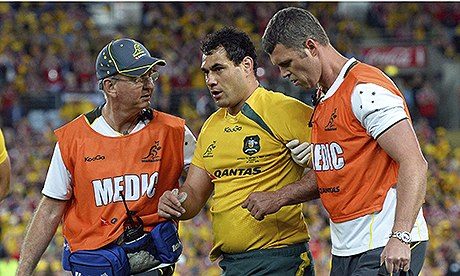
Rugby players worldwide have been told to wake up to the long-term health risks of concussion, with an American expert suggesting the possibility of lawsuits may be causing the sport's administrators to play down the potential link between repeated blows to the head and dementia in later life.
The board of the Rugby Players' Association were given a presentation in Londonon Monday described by the player union's chief executive, Damian Hopley, as "unnerving" in its stark portrayal of the long-term effects of brain trauma. The issue is fast gathering momentum, with a major concussion conference to be held in London on 7 November.
According to Chris Nowinski, a former college gridiron player who suffered severe post-concussion symptoms and is the president of the Boston-based Sports Legacy Institute, there is no question the incidence of chronic traumatic encephalopathy in the brains of American football players is a growing issue for rugby.
This contradicts the view of the Rugby Football Union's head of sports medicine, Simon Kemp, who has insisted there is no "ticking time bomb" in terms of longer-term health issues.
"The world has been slow to react to this," Nowinski said. "Right now there is overwhelming evidence that trauma is a trigger for CTE. I'm not even aware of another hypothesis that could link this wide group of people to CTE.
"To try to tell people not to worry about CTE is not fair to people putting themselves at risk.
"Early census data suggests rugby is not that far off American football. There have been a lot of incidences and some of them have been extreme. It's almost less of a medical discussion and more of a legal discussion. People have learned there are financial consequences to recognising that brain trauma has lasting health consequences.
"Everybody in contact sports has to become aware there is a cost to brain trauma, especially if you don't take it seriously. Someone has to care for people with dementia."
With the autumn Tests looming, Hopley believes the game must avoid further incidents such as a clearly unwell George Smith being allowed to return to the field during the Lions Test series this summer in apparent defiance of revised concussion protocols.
"The world is watching now," Hopley said. "There is no hiding place and we need to be acutely vigilant. We don't want to get into a scaremongering scenario and terrify people but we need to be aware of all the facts. Rugby has become even more of a collision sport in the last 10 years. We'd be mad not to take into account what is happening elsewhere."
All this comes at a time of increasing player-welfare scrutiny, with the RPA revealing that 11 professional players have been forced to retire in the first two months of the season. Year on year Hopley says the overall number of retirements is up by 88%, despite massive improvements in rehab and medical treatment.
In the US, there have been moves in gridiron to restrict the number of full-contact training sessions to only 14 over a season-long period of 18 weeks. In professional rugby in England players might expect to do two per week for eight months, with the RPA board already pushing hard for a mandatory four to five-week off-season rest period for all players.
The RPA is also concerned about a shortage of insurance companies prepared to offer specialist cover to Premiership players. "It's key that players should have the opportunity to insure themselves properly," said Will James, the Gloucester lock and RPA chairman. "It's not if we're going to be injured, it's when."
Wannabe professionals have been given more food for thought by the Irish Rugby Football Union's nutritionist, Ruth Wood-Martin, who has warned young players they may be risking their health by using sports supplements.

